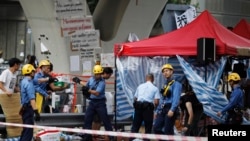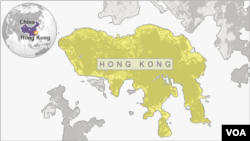Hong Kong protesters have removed key barricades and begun leaving one of the main protest sites ahead of a government deadline to clear the streets.
Pro-democracy demonstrators on Sunday removed some barriers blocking access to the government's downtown headquarters and left the area. But the protesters appeared divided, and some vowed to stay put.
The scene was quiet in the early morning hours of Monday, and students have vowed not to withdraw from another protest site in the central financial district, where tens of thousands have been gathered for more than a week.
Student protest leaders say they have been holding talks with government officials on possible formal discussions with Hong Kong Chief Secretary Carrie Lam, who was appointed last week by Chief Executive Leung Chun-ying to begin a dialogue with the students.
Protesters, who want true universal suffrage for the territory's next election, have been calling for Leung's resignation. But the chief executive has said he will not step down. On Saturday, he warned that all necessary action will be taken to ensure government employee access to offices this week.
Alex Chow, secretary general of the Hong Kong Federation of Students, expressed skepticism when he addressed rally participants Sunday.
“We all agree that negotiation is a must if we want to achieve significant progress. But it still [remains to be seen] whether the government is sincerely wishing to have a deal with Hong Kong citizens,” Chow said.
Second week
Tens of thousands of protesters, including many students, are now entering a second week of round-the-clock rallies.
Chief Executive Leung was forced to close the Central Government Offices on Friday because of the crowds of protesters blocking its access roads, with 3,000 civil servants unable to go to work.
While the students have agreed to give civil servants access to the government complex on Monday, they will not withdraw from the business district, student leader Chow said.
“For sure not. You can see the bridge, the pathway up there [by the Central Government Complex] it is open. So they have no excuse to eliminate the citizens here right now,” he said. “Of course, we are still very concerned about the safety of citizens here, so we will still ask our marshalls to observe if the police act.”
Officials said they intended to have key streets open for schools and offices by Monday morning, but it was unclear whether they would act to clear the streets and other areas by force or just settle for a partial victory in clearing some roads.
The government announced a reopening of schools and some roads, but indicated some disruptions were likely to continue.
The protesters remain calm and determined. But there there is a palpable sense of concern in the air.
Anna Chow, a 21-year-old student, manages a first-aid station.
Wearing a gas mask and goggles after being tear-gased last week, she said, while she feels afraid, she believes police brutality will only bring more supporters out to the streets.
“I feel it is unacceptable. We are all educated. How can it happen in Hong Kong? I really don’t trust the police force," Anna Chow said.
Scuffles early Sunday
Earlier Sunday, Hong Kong police scuffled with demonstrators, using pepper spray and batons in the Mong Kok district of the territory where violent clashes between pro-democracy students and their opponents occurred Friday and Saturday.
Pro-democracy protesters staged a huge rally Saturday in the city's business district, a short while after Leung declared that all necessary action will be taken to make sure city streets are opened and to ensure government employee have access to offices this week.
Also on Sunday, Occupy Central, one of the groups organizing the protests, said protesters would leave the Mong Kok site to reinforce the main demonstration area and would allow access to a blockaded road near the government's downtown headquarters.
However, the decision was not immediately backed up by student protesters, the other main group behind the weeklong demonstrations. Protesters in Mong Kok appeared divided about whether to stay put or decamp to the city's Admiralty area.
Fearing a police crackdown may come within hours, other protesters who have paralyzed parts of the Asian financial hub with mass sit-ins also pulled back from outside Leung's office, with police removing barricades nearby.
"People will come out again, I'm sure. Because we are not in Mong Kok, we are not in Admiralty - the battlefield is the people," said Hugo Lau, an internet technology professor.
Hong Kong tensions
Meanwhile, many Hong Kong residents expressed anger and frustration at police handling of the unrest, with some accusing security forces of cooperating with criminal gangs, failing to make arrests and helping some attackers to exit the scene quickly.
Businesses, shop owners and taxi drivers have added to the pressure on the protesters to end their occupation and disperse.
The government said all secondary schools in Central, Western and Wan Chai districts would re-open on Monday, but primary schools and kindergartens would remain closed.
The protests mark the biggest unrest in Hong Kong since Beijing took control of the one-time British colony in 1997.
China's ruling Communist Party leadership in Beijing has dismissed the Hong Kong protests as illegal, but appears to have left it to Leung and his government to find a solution.
As the protests have ebbed and flowed, they have caused uncertainty for businesses and triggered a more than 7 percent drop in the value of shares on the Hong Kong stock exchange in the past month.
Financial Secretary John Tsang wrote in a blog on Sunday that Hong Kong was at a critical moment and its “financial foundations and core values have inevitably been shaken.”
Allan Zeman, a member of the 1,200-strong committee that selects candidates for Hong Kong's top job, said the protesters had made their point, but businesses, particularly those paying high rents, were being hit. “If they carry on too long, you're asking for trouble,” he told Reuters.
Hong Kong police arrested as many as 30 people since Friday in connection with the clashes, which are reported to have injured at least 18 people, including several police officers.
Brian Padden and Ivan Broadhead contributed to this report from Hong Kong. Some material for this report came from Reuters, AP and AFP.






